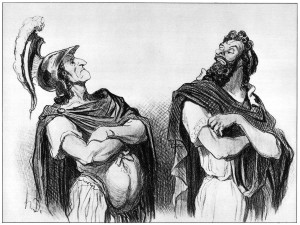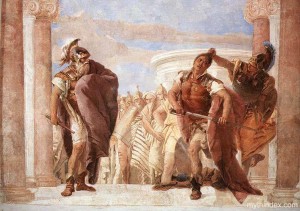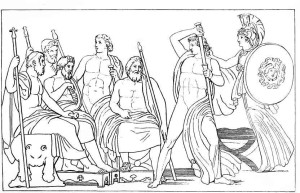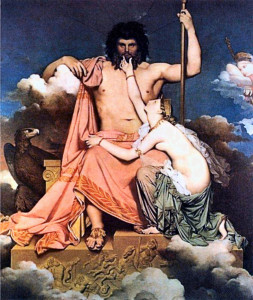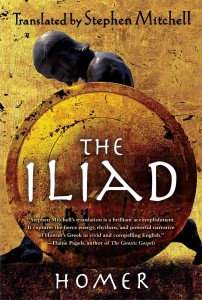THE STORY: (46 minutes) Ten years into the siege of Troy a priest of Apollo arrives at the command tent of Agamemnon, Commander in Chief of the Greeks. The priest makes a simple request of Agamemnon. Agamemnon refuses, and Greek soldiers die in the thousands. And then things turn truly ugly…
THE COMMENTARY: DID A GUY NAMED HOMER EXIST, & DID HE WRITE THE ILIAD? (16 minutes; begins at 46:00) This particular episode of Trojan War: The Podcast brings our story arc into Homer’s Iliad itself. I use the post-story commentary to discuss “all things Iliad” including: who was/was there a Homer; how was the Iliad composed; and why do we have copies of the Iliad today? I begin by reminding listeners that the first ten episodes of Trojan War: The Podcast are not found in Homer’s Iliad. Rather, they are part of what scholars refer to as the Trojan War Epic Cycle: a jambalaya of stories, bits of stories, accounts of bits of stories, and references to accounts of bits of stories, that have managed to survive, some from as early as the Bronze Age, up to now. Those stories collectively “set the stage” for the events accounted in Homer’s Iliad: events which only last a matter of months in this multi-decade war. I then remind readers that – some episodes from now – our story will leave the Iliad, and continue on with more episodes drawn from the Trojan War Epic Cycle. I then turn our conversation to the current academic consensus that there was no Homer, in the sense of a solitary author who created an original artistic work drawn completely from his own imagination. The current consensus is that events recounted in the Iliad are drawn from centuries of oral storytelling tradition that predates Homer. So “Homer”, it turns out, was either a brilliant compiler, editor and re-teller of existing stories from the oral tradition, which he then assembled into an artistic masterwork titled the Iliad (a group of Homeric scholars called “unitarians” subscribe to this view), or alternately, “Homers” was a collection of less-than-brilliant compiler(s) who assembled existing stories from the oral tradition into a great (but flawed) work titled the Iliad (the view held by Homeric scholars called “separatists” or “analysts”). I confess to finding the arguments of unitarians and separatists/analysts equally compelling, depending on what section of the Iliad I am reading when I think about the question. Then I get on with detailing how the Iliad managed to survive intact from creation (c. 700 B.C.E.) to the present day. Finally, I confess to some trepidation in beginning to tell episodes drawn directly from the Iliad: one of the masterworks of Western literature. I conclude by encouraging you to go read the Iliad for yourself – it’s a pretty good story! Jeff
RELATED CONTENT
UNDERSTANDING BRONZE AGE HONOR: KLEOS, GERAS & TIME (PDF)
RELATED LINKS
GREEK MYTH COMIX (the Trojan War as a brilliant comic strip!)
RELATED IMAGES
- BOOK A LIVE TELLING or “EDU-TAINMENT” (click here)
- AGAMEMNON AND ACHILLES QUARREL Honoré Victorin Daumier French 1808-1879 (not quite how I envision Achilles)
- THE ANGER OF ACHILLES, Jacques Louis David 1819
- THE RAGE OF ACHILLES Giovanni Tiepolo 1696-1770 (Athena grabbing Achilles’ hair to stop him from killing Agamemnon)
- MINERVA AND ACHILLES John Flaxman 1755-1826 (note Minerva is the Roman name for Athena)
- ZEUS AND THETIS Jean August Ingres 1801 (check out eavesdropping Hera!)
- THE ILIAD Stephen Mitchell translation, 2011 (my personal favourite translation!)



